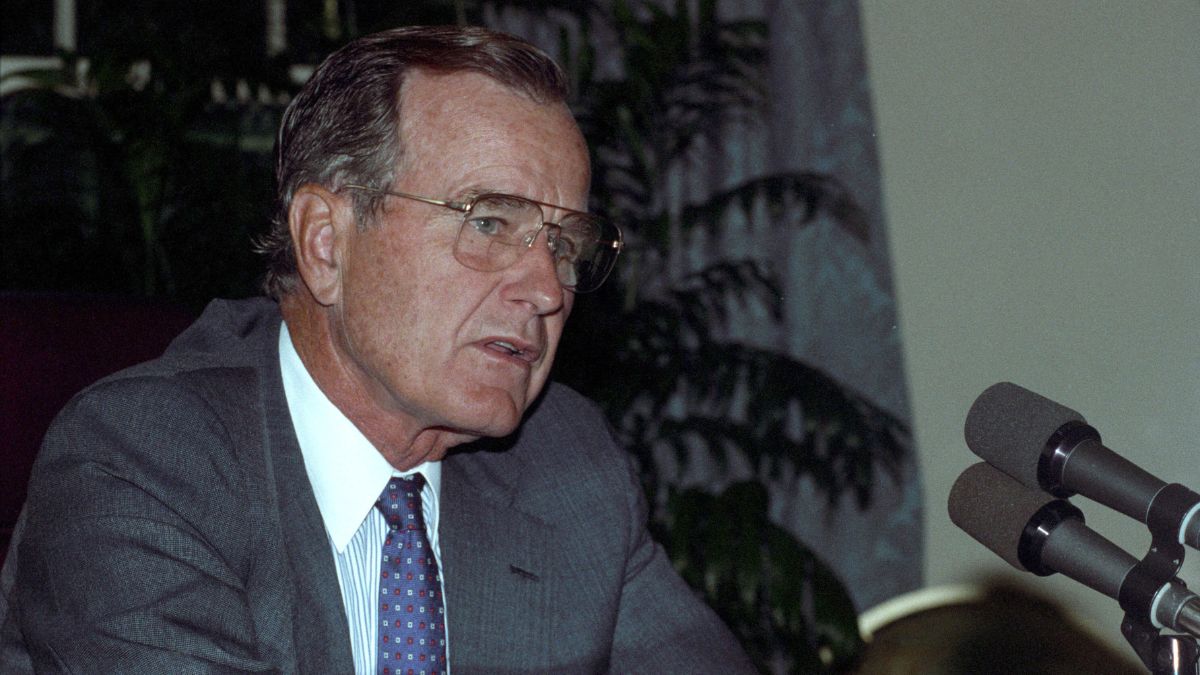Editor’s Note: This profile is part of a series taking a closer look at US presidents ahead of the 2024 presidential election between Donald Trump and Kamala Harris.
George HW Bush, the 41st President of the United States, is remembered as a seasoned diplomat and a pragmatic leader whose presidency was defined by the end of the Cold War and the Gulf War.
Despite his extensive experience in foreign affairs and a series of foreign policy successes, Bush’s single term in office was cut short by domestic economic woes, leading to his defeat in the 1992 US presidential election.
Bush and the War
George Herbert Walker Bush was born on June 12, 1924, in Milton, Massachusetts, into a prominent New England family. His father, Prescott Bush, was a US senator from Connecticut, and young George was raised with an emphasis on public service.
After the attack on Pearl Harbor, Bush postponed his university education to enlist in the US Navy during World War II. At just 18, he became one of the youngest naval aviators, serving as a torpedo bomber pilot, he flew 58 combat missions in the Pacific and earning the Distinguished Flying Cross.
After the war, Bush attended Yale University, graduating in 1948 with a degree in economics. He then moved to Texas, where he entered the oil industry, founding his own oil company. However, his sights were set on politics, and in 1966 he was elected to the US House of Representatives from Texas.
Impact Shorts
More ShortsBush’s political recognition
Bush’s political ascent was steady. After serving two terms in US Congress, he held several high-profile positions, including US Ambassador to the United Nations, Chairman of the Republican National Committee, US envoy to China, and Director of the Central Intelligence Agency (CIA). His broad foreign policy experience and connections within the Republican Party made him an ideal candidate for national office.
In 1980, Bush ran for the Republican presidential nomination but was defeated by Ronald Reagan. Reagan selected him as his running mate, and Bush served as vice president for two terms from 1981 to 1989. During this time, he played an active role in the Reagan administration, particularly in areas of national security and foreign relations.
Presidency: 1989–1993
In 1988, George HW Bush ran for president, positioning himself as the heir to Reagan’s legacy while promoting a vision of a “kinder, gentler” America. His campaign famously promised, “Read my lips: no new taxes,” a pledge that would later haunt his presidency. He won the election decisively, defeating Democrat Michael Dukakis.
Bush’s presidency was defined by significant foreign policy achievements. His administration oversaw the peaceful end of the Cold War, including the fall of the Berlin Wall in 1989 and the subsequent reunification of Germany. He worked closely with Soviet leader Mikhail Gorbachev to manage the dissolution of the Soviet Union and promote global stability.
Bush’s most notable achievement came in 1991 with the Gulf War. After Iraq, under the leadership of Saddam Hussein, invaded Kuwait in 1990, Bush built an international coalition to liberate the small oil-rich nation. Operation Desert Storm, launched in January 1991, was a swift military victory that pushed Iraqi forces out of Kuwait in just six weeks. Bush’s leadership during the conflict boosted his approval ratings to unprecedented levels.
Trouble at home
While Bush’s foreign policy successes were widely praised, his domestic agenda was less successful. His administration struggled with a sluggish economy, rising unemployment, and a growing federal deficit.
In 1990, facing pressure to reduce the budget deficit, Bush agreed to a compromise with Congress that raised taxes, breaking his famous “no new taxes” pledge. This decision angered conservatives and damaged his credibility with many in his own party.
Bush’s administration also oversaw the signing of significant domestic legislation, including the Americans with Disabilities Act of 1990, which prohibited discrimination based on disability, and the Clean Air Act Amendments of 1990, aimed at reducing pollution.
Despite these accomplishments, economic difficulties, including a recession that began in 1990, overshadowed his presidency. By 1992, Bush’s popularity had plummeted, and he faced strong challenges from both Democrat Bill Clinton and independent candidate Ross Perot.
Defeat in 1992 and post-presidency
In the 1992 presidential election, Bush lost to Bill Clinton, largely due to concerns over the economy and perceptions that he was out of touch with average Americans. His defeat made him the first US president since Jimmy Carter to lose a re-election bid.
After leaving office, Bush largely retreated from politics, focusing on philanthropic efforts and maintaining a low public profile. He worked on humanitarian projects with former political rival Bill Clinton, including disaster relief efforts for victims of the 2004 Indian Ocean tsunami and Hurricane Katrina in 2005.
Bush remained a respected elder statesman in US politics, celebrated for his foreign policy expertise and his role in guiding the nation through a turbulent period in global history. His son, George W Bush, would later follow in his footsteps, becoming the 43rd President of the United States.
Legacy of George HW Bush
George HW Bush’s legacy is often framed around his achievements in foreign policy. He is remembered as a leader who successfully navigated the US through the end of the Cold War, managing delicate relationships with foreign powers while promoting international cooperation.
His handling of the Gulf War, where he highlighted multilateralism and coalition-building, is also regarded as a textbook example of international diplomacy and military strategy.
However, his presidency is also marked by the economic challenges and his controversial decision to raise taxes, which contributed to his electoral defeat in 1992. Though not as transformative on the domestic front, Bush’s presidency is often viewed as a period of stability and skilled diplomacy during a time of global change.
Bush passed away on November 30, 2018, at the age of 94.


)

)
)
)
)
)
)
)
)



